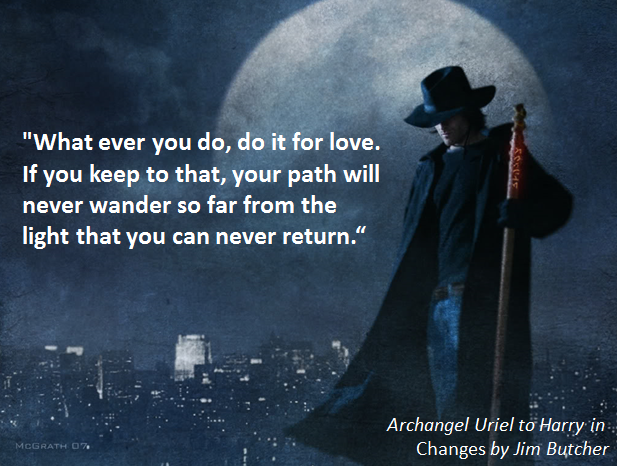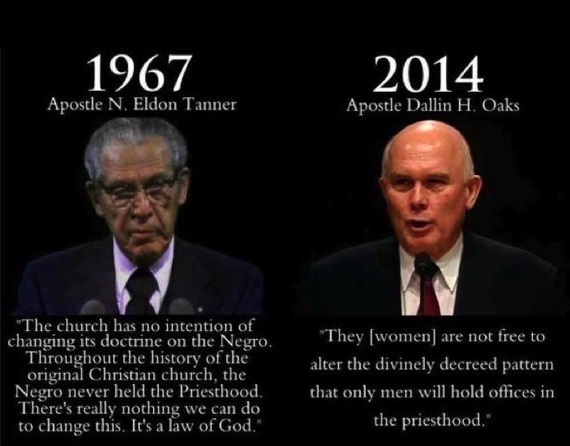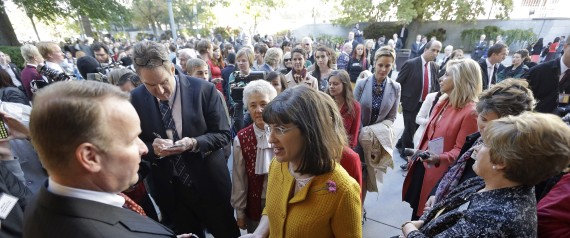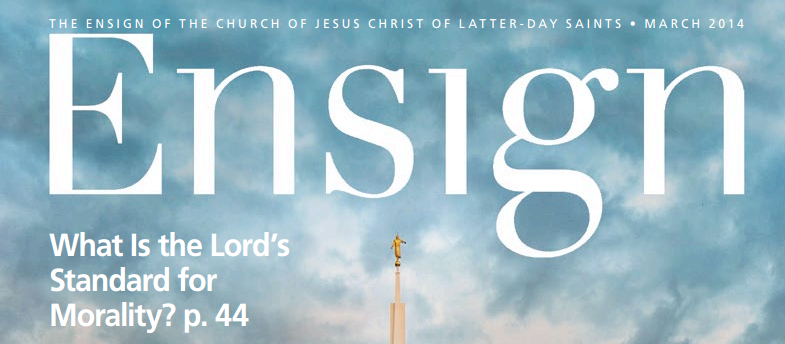I skipped the last post or two at Times And Seasons ’cause I thought I was pushing through to the end of another project I’m working on and wanted to give it all my attention. Turns out, however, that I wasn’t as close to the end as I thought. So I’m back to regular posting (every other week) starting this morning with False Choices and Fence Holes. It’s a response to a By Common Consent post that I saw going around on Facebook and deals with the way liberals and conservatives talk to each other about potential problems the Church is facing. It’s relatively short (as m pieces go) and I’ve gotten some positive feedback on it already, so check it out!
Mormonism
Times And Seasons: Should I Stay or Should I Go?
I have a new post up at Times And Seasons this morning, continuing the series of posts that has, intentionally or not, sort of become my Internet testimony. Not sure that’s how it comes across to others, but it’s pretty much how I see it. The post also features a quote from my favorite Dresden Files book. Some might take a quote from popular urban fantasy to be an indication that I’m not taking my subject matter seriously. They would actually be underestimating how seriously I take my urban fantasy. I say this partly in jest, partly because of how much I genuinely love the Dresden Files, and partly because I just really like the idea of finding serious lessons about serious topics in unexpected, mundane places.[ref]This is why I’m excited about the new focus for fellow DR Editor Walker Wright’s own blog, The Slow Hunch. He’s a genius at this topic, especially when it comes to business.[/ref]
Also, in case y’all missed the announcement, Walker and I got published in Square Two with an article called “No Poor Among Them”: Global Poverty, Free Markets, and the “Fourfold” Mission. It’s about the topic of poverty and religion, and you should all read it because it’s awesome.[ref]I am not biased.[/ref]
About that Elder Tanner / Elder Oaks Meme
This image seems to have started making the rounds before Elder Oaks even finished his remarks on priesthood authority. I mostly ignored it at the time, but a couple days ago I came across this post which analyzed the origins of the two quotes. Biggest point? The Elder Oaks quote is wrong. He did not say that women are not free to alter the divinely decreed pattern. He said that the General Authorities are not free to make that change. That takes it from a kind of chauvinist slap-down to an expression of modest humility in what leaders can do. And, after all, the argument that God would have to reveal His will on this matter is something that even OW seems to support.
Anyway, the background is interesting, so check out the whole article.
Does the Internet Erode Religion?
New research has found a significant correlation between time spent online and decline in religious affiliation over the past few decades. Correlation is not causation, as the article points out, but the research feels that the relationship is causal based on the fact that most other possible factors have already been controlled for. These statistics are not iron-clad, but let’s assume for the moment that they are true. What should we conclude?
Although the article does not suggest this, the standard assumption is that when people go online they will find out uncomfortable truths about their religion that they were not taught growing up, and that this will have a double-impact that drives them away from their faith. First, the new information is intrinsically troubling. Second, the fact that they didn’t learn about it creates a sense of betrayal. (This theory is widely known among Mormons.) There’s a corollary to this which states simply that religion is kind of dumb and irrational, and so the more educated people are, the less religious they become. (That correlation is also well-known.) So perhaps the Internet is just educating people to a sufficient point where they outgrow religion.
I feel like I should pause for laughter at this point, as everyone spends a couple of moments thinking about what most actual Internet usage is like. Aside from Wikipedia, it’s basically lolcats, porn, and pointless political debates. Not exactly a crash-course in human intellectual history.
So I don’t take seriously the “Internet makes people too smart for religion” theory, but I do think that the “Internet airs religion’s dirty laundry” theory is worthy of consideration. But it’s still a matter of interpretation. The superficial response, of course, might be that more knowledge is always better and so people learn more and ditch religion and they should. But, thinking again of the Mormon intellectual community as a model again, one thing I’ve noticed is that there tend to be three levels of knowledge about religion.
- The Surface
Folks at the surface really don’t know much about their religion at all, and as a result they are not really troubled by it. Conversely, they are probably not comforted by it either, at least on an intellectual level, although the emotional resilience of tradition can still be important and beneficial. - The Mantle
Go down beneath the surface, and things start to look weird and uncomfortable. As a simple example: folks who are born and raised in a particular faith almost always undergo a kind of cognitive vertigo when they one day see traditions and assumptions that they had taken for granted through the eyes of an outsider. All religions are kind of weird, just like all families are kind of weird, and this can easily lead to a sense of disenchantment and disassociation. - The Core
A lot of folks get as far as the mantle and decide that they have had enough, but other folks press deeper. They realize, for example, that their religion is weird to other traditions not because it has some defect, but just because everything that is foreign seems weird. Properly contextualized, that ceases to be an irritant and can even become comforting, the same way that we can treasure our family traditions even after we realize that they may have no real rational basis. These guys dig deeper into their respective traditions, unearth the problems, but then also find gems and insights that (for them) are worth the trouble.
In other words, even if we assume that the Internet is exposing people to a host of uncomfortable truths about their faiths[ref]And let’s be honest, that’s pretty generous given a lot of the conspiracy theory nonsense that is also out there about all religions.[/ref] there’s already a religious concept for that experience: the refiner’s fire. Nietzsche may be an odd source of comfort for the religious, but the old “whatever doesn’t kill you” line is actually probably more true of ideas than it is of people.
There’s a really ugly way this theory can be applied. You could say that the folks who don’t stick around are too weak or ignorant to handle the fire, and so good riddance. That’s taking the metaphor too far, however. I don’t buy into the judgmentalism behind it (we can’t really know the reason people have for leaving or for staying), nor the superiority behind it (notice that I didn’t specify any particular denomination or faith tradition, for example), nor the mean-spiritedness behind it.
All I’m saying is that sometimes the folks who have to struggle to retain or regain their faith are the ones who realize more than anyone else exactly what it is they have.
Times And Seasons: As Much As I Know Anything
 Today’s post for Times And Seasons is basically just my testimony. I’ve had lots of people ask me why I believe over the years, and usually I’ve been incapable of giving a simple, concise answer. When I got asked the question again the week before last, however, I finally had an answer. Along with it, I had an understanding of why I’d been unable to express my faith more easily in the past. Read the post at Times And Seasons for the rest. It’s called As Much As I Know Anything.
Today’s post for Times And Seasons is basically just my testimony. I’ve had lots of people ask me why I believe over the years, and usually I’ve been incapable of giving a simple, concise answer. When I got asked the question again the week before last, however, I finally had an answer. Along with it, I had an understanding of why I’d been unable to express my faith more easily in the past. Read the post at Times And Seasons for the rest. It’s called As Much As I Know Anything.
Incidentally: I neglected to link to my last Times And Seasons post when I posted it two weeks ago. That one was called Human Evolution: Problems and Possibilities.
My Pops in a Web Comic
Garden of Enid is a fun, Mormon web-comic that I read regularly. (You should too!) So imagine my surprise and delight when it turns out that Friday’s comic was about my very own dad! Yup, pretty much the finest hour for the Givens Clan, I’d say.
In all seriousness, and at the risk of sounding sappy, I am extremely proud of the work that both my mum and dad do. They are the best. (And I generalize from a comic about my dad to both of my parents because I know how much my mum has been there every step of the way, even if she didn’t come out and coauthor a book until quite recently.)
What Does Ordain Women Really Want?
Disclaimer: If you do not like sarcasm, you may find it difficult to get through this. I understand your point of view. But please note that I sass with love.
I recently stumbled upon the idea, from an OW supporter, that the OW movement simply wants the prophet to pray about Mormon women in the priesthood. They just want some updated revelation. This was of course surrounded by others saying that women “need” the priesthood for eternal progression (I won’t quibble about that today) and women have the “right” to the priesthood (ditto). However, let’s take for a moment the idea that all that OW wants is for the prophet to hear their concerns and pray on their worries. Let’s say that all the people who say women need, want, and have the right to the priesthood are just miscommunicating their desire to get the prophet to pray for revelation. There is a scriptural tradition for such requests in ancient and modern texts.
In this case, I hate to tell you, but OW you are going about it in all the wrong ways. Nate Oman discussed to this in his poorly received (at least by OW) article on why the movement is currently set up for failure. But I can tell you one reason why you are doing it wrong: I had no idea you just wanted more revelation. In fact, I thought you only wanted one particular revelation, if that, otherwise you just wanted ordinations to begin yesterday.
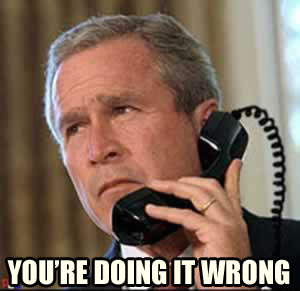
Now, I may just start rehashing some of the things Nate and my husband have already said, but I hope I can bring a little more to the discussion. First of all, I am a woman, so my anatomy does not disqualify me from disagreeing with other women (truth). Secondly, I have children, so I speak for all mothers (sarcasm). Third, I am getting my PhD in a science, so I am liberated, intellectual, academic, and logical, and I speak for all the people who are or prefer those things (again, sarcasm). I also grew up in a household that was technically without the priesthood: yes my mom was a working single mother, I was the product of, whisper it with me now, divorce, and there were no boys to hold up the mantle. (But I could go on and go on about the many incredible, humbling, and teaching ways the priesthood blessed my family, headed by a divorced single mother with cancer, but I will save that for next time.)
Let me explain how the OW movement looks through the eyes of this tired, stressed-out mother and PhD student, who grew up in a completely imperfect Mormon home located in the South. I realize that many people are invested in this movement, and any negative thing I say will sting. I understand. When I received the first draft of my Honors thesis back from my undergraduate advisor, which looked like he had gleefully bled all over every. single. page. I was devastated; like someone had handed me back my baby and said, “Actually, she’s hideous.” So with that in mind, I say, the OW movement appears to be a media-hungry enterprise that cares more about acceptance from the world than working together with the everyday Mormon woman and is solely seeking for everyone, including the prophet, to confirm that its opinions are right. Phew, I know, that came out strong. Commence picking it apart!
Really though, I’m not saying this is what the movement is, or that any particular member feels that way. But, overall, this is how it appears to me. When you have the media discussing what is a very personal and spiritual part of doctrine, when there are more spotlights on Kate Kelly than I can count, when you don’t go through the grass root efforts of talking with sisters who disagree (or at least don’t talk to them kindly or with respect), when you reciprocate the church’s “I’m a Mormon” campaign for a cause, when you have members who very much appear to be making demands (beyond asking for a prayer) from the prophet, it makes me very uncomfortable.
I think part of the problem is that a grass roots effort, something akin to a letter writing campaign, would appear to have much less effect than if we can get the NYT talking about it (although I truly believe the prophet would respond to a heartfelt call from the sisters). As statistics have shown, Mormon women, in general, don’t want the priesthood. Most women see it more as a responsibility and less as an opportunity, and we’ve already got a lot on our plates. There may even be some women who take a don’t-tempt-fate attitude towards asking for the priesthood. I know sometimes I avoid praying for service when I’m really busy, sometimes I do it anyway because I don’t know how I’ll survive without the blessings providing services brings. And I know recently when our family had some financial struggles, we were blessed not with our dollar stretching further, but with the opportunity to stretch our work hours even longer.
So, OW, if you really want to be the messengers for women who just want the prophet to request revelation, I have a few suggestions for you.
First, unify your message. Don’t get caught up in what the world wants to say about the oppression of women in our completely backwards (to them) religion. Don’t demand, plead. The Lord cares about your pains and your desires, but it’s hard for some of us other Mormons to understand what you’re really asking for, if simple revelation is really what you want. In fact, I could maybe get behind a simple desire for a current prophetic response, if I’m in an OK-to-tempt-fate mood. And there is common ground between us for more sensible participation by women throughout the church, regardless of our desire for the priesthood.
Second, ban the hate-filled comments towards those who disagree. It may be true that some of us don’t understand what you are really asking for, but that doesn’t mean we just don’t know what’s best for us. That doesn’t mean we don’t understand our place in the world, the church, and our home. That doesn’t mean we don’t care about you or are distracted by some nebulous patriarchy. We are strong, loyal, and faithful women trying to make it right for our families through this crazy world. We are all in this together, even if we don’t always agree on the same means.
Finally, turn your purpose to service. If women are hurting and they feel having the priesthood will solve that hurt, help us help them. Help us alleviate their pain and suffering. We can’t give them the priesthood, but we can serve them. Please, teach us how to serve these women, and let us serve you. It has to go beyond a catchy “How Not to Speak to Mormon Feminists” and into actual deep caring for one another. The Relief Society has all the potential to allow us to constantly uplift each other, let’s harness that across the divide of OW.

On Ordain Women Being Confined to Free Speech Zones
Twice a year the Church of Jesus Christ of Latter-day Saints holds a General Conference, which consists of 4, 2-hour meetings for the general membership of the Church to attend at the giant conference center in Salt Lake, at church buildings around the world, or even from home via Internet and other sources. In addition to the general membership meetings, there is a Priesthood meeting for men and boys 12 or older and a combined meeting for women and girls as young as 8. Last year, at the Fall General Conference, the feminist Mormon group Ordain Women staged a protest at the male-only meeting. OW seeks to have women ordained to the Mormon priesthoods (there are two orders), but their request was denied and they were barred entrance. The incident made headlines, which seems to have been the purpose.[ref]I base this on both the language used (e.g. “Priesthood Session Action”) and also on the explicit emphasis placed on the publicity the event garnered: ” The images of us watching men and boys walk in instead of us and of each of us asking for permission to enter are powerful.” Alternatively, just look at the cameras and reporters in the pics.[/ref]
OW plans to repeat their action again at the upcoming April General Conference, and this has provoked a preemptive response from the Church. An official statement that was released to the public makes two important statements. First, it states that male-only ordination to the Aaronic and Melchizedek priesthoods is “a matter of doctrine.” This draws a deliberate contrast with the racial priesthood ban which the Church rescinded in 1978 and further repudiated in a statement earlier this year. That practice was never based on any canonized revelation, and is now[ref]Original version said “had been viewed” which implied to some folks that it was always seen as just policy. That’s not accurate, and it’s not what I intended to convey.[/ref] viewed as a matter of policy (transient) as opposed to doctrine (permanent). The new statement even went farther and specifically disavowed the folk theology that had grown up around this policy: “None of these explanations is accepted today as the official doctrine of the Church.”
This new statement on race and the priesthood is part of a major, but quiet, new initiative in how the Church talks about its own history and other sensitive issues. It is, in that sense, a sign of progressiveness in the Church. I, and many others, applauded the document when it came out. So it is very telling that the Church chose to refer to this document (however obliquely) in their response to OW. Referring to a new, progressive document conveys the message, “This far, and no farther” more powerfully than a reliance on an older or more traditional source would.
Which brings us to the second, and more controversial, statement:
If you feel you must come and demonstrate, we ask that you do so in free speech zones adjacent to Temple Square, which have long been established for those wishing to voice differing viewpoints.
The formal statement has drawn headlines of its own weeks ahead of the OW demonstration. Kate Kelly, the founder of OW, is quoted in the Salt Lake Tribune as stating flatly:
We have nothing in common with those people [referring to other demonstrators in the free speech zone]. They are seeking to destroy the church. We are not against the church — we ARE the church.
The idea that the Church has chosen to ostracize OW members is widely seen by supporters of OW as victory for their movement. A raft of blog posts from prominent Mormon women, like Jana Riess, have come out stating that the Church is behaving like a bully. Riess writes:
There is something deeply symbolic about yesterday’s statement, for it reveals what the Church apparently thinks of the feminists within its fold. We, as faithful and active members of the Church, are being lumped together with the same anti-Mormon protestors who routinely crash General Conference and shout that the Mormon religion is of the devil. These protestors have started fistfights with conference-goers and even stomped on or burned temple garments.
In line with characterizations like these (although not necessarily as an endorsement of them)[ref]Kristine pointed out in a comment to this piece: “I said nothing about the merits of either side’s case; I was asked to opine on the way the media would respond, and I did.”[/ref], Kristine Haglund, another prominent Mormon feminist, called the decision a “PR disaster for the church.” She went on o say that “Goliath is never going to get better press than David — the optics are terrible.” That’s all I intended folks to glean from her quote, that it was a bad PR move, but I [/ref] On Facebook I’ve seen friends express similar twin feelings of deep hurt at being excluded along with a sense that soon the tide will turn in their favor and the members of the Church will come to see OW as the good guys. I think both of those reactions are mistaken.
 First, while my heart goes out to those who feel stunned and betrayed by this announcement, I’m afraid they may have set themselves up for tragedy. The movement for female ordination often models their approach on scriptural precedents like the parable of the importunate widow, but this is a very high-risk approach to activism. But this parable is problematic for a couple of reasons. First, it is about a widow and therefore someone who self-evidently has a valid claim.[ref]The parable is more commonly known as the parable of the unjust judge.[/ref] Is it “self-evident” that we ought to ordain women? Obviously most Mormons don’t think that it is. Second, it seems like a serious mistake to apply the parable to conventional PR pressure tactics targeting the leaders of the Church instead of prayer to God. I’m not suggesting that OW should only pray about this and nothing more, but I am suggesting that enlisting this parable as a justification of conventional protests is a mistake. Unfortunately both these elements, the believe that female ordination is self-evident and also the belief in scriptural justification for their tactics mean that OW may have not really prepared themselves for the possibility that the Church simply isn’t going to go their way. I’ve often seen Mormon feminists pronounce total confidence in both the rightness and the inevitability of their cause. In light of such great expectations, there is simply no way that the Church could offer a definitive “no” that would not feel crushing.[ref]By contrast, I have often seen folks who oppose female ordination express a willingness to adapt if God reveals that to be the course for the Church. It seems this has emboldened the OW movement instead of encouraging them to consider their own back-up plans.[/ref]
First, while my heart goes out to those who feel stunned and betrayed by this announcement, I’m afraid they may have set themselves up for tragedy. The movement for female ordination often models their approach on scriptural precedents like the parable of the importunate widow, but this is a very high-risk approach to activism. But this parable is problematic for a couple of reasons. First, it is about a widow and therefore someone who self-evidently has a valid claim.[ref]The parable is more commonly known as the parable of the unjust judge.[/ref] Is it “self-evident” that we ought to ordain women? Obviously most Mormons don’t think that it is. Second, it seems like a serious mistake to apply the parable to conventional PR pressure tactics targeting the leaders of the Church instead of prayer to God. I’m not suggesting that OW should only pray about this and nothing more, but I am suggesting that enlisting this parable as a justification of conventional protests is a mistake. Unfortunately both these elements, the believe that female ordination is self-evident and also the belief in scriptural justification for their tactics mean that OW may have not really prepared themselves for the possibility that the Church simply isn’t going to go their way. I’ve often seen Mormon feminists pronounce total confidence in both the rightness and the inevitability of their cause. In light of such great expectations, there is simply no way that the Church could offer a definitive “no” that would not feel crushing.[ref]By contrast, I have often seen folks who oppose female ordination express a willingness to adapt if God reveals that to be the course for the Church. It seems this has emboldened the OW movement instead of encouraging them to consider their own back-up plans.[/ref]
Meanwhile, however, Mormon feminists often do not seem cognizant of the fact that their requests would cause just as much pain to fellow members as they themselves feel today. If they feel excluded by this statement, imagine how categorically and totally traditional Mormons (who vastly outnumber Mormon feminists) would feel were the Church to repudiate their faith and their convictions by instituting female ordination. There genuinely are two sides to this issue, and those who oppose female ordination frequently do so because of their own equally sincere convictions about what it means to be a Mormon woman. I understand that being asked to stand next to anti-Mormons may feel like symbolic ostracism. Does OW understand the extent to which, if their requests were granted, huge numbers of Mormons would feel just as betrayed? It may be asking too much while the sting is still fresh, but feelings of hurt and betrayal should eventually be examined in this context. This story ends with broken hearts, no matter how it ends.
Second, and for a great many reasons, I do not think that the Church’s statement will result in a significant shift in Mormon perception of OW. It’s important to step back and realize that OW does not even speak for all Mormons who feel dissatisfied with the status quo as it relates to the priesthood and gender issues broadly defined. As I’ve written before, the word “conservative” takes on strange connotations in a religion that is dedicated to ongoing revelation. Mormons believe in a Heavenly Mother, but we know very little about Her. Mormons believe that there are other scriptures beyond the Book of Mormon, but we don’t have them yet. We believe that God “will yet reveal many great and important things pertaining to the Kingdom of God.”[ref]9th Article of Faith[/ref] In a broad vista of possible futures, the movement to ordain women to the Aaronic and Melchizedek priesthood orders is one tiny possibility that does not have broad support even among Mormons who look for forward to further light and knowledge.[ref]I also suspect that the Bloggernaccle is something of an echo chamber for a relatively radical Mormon minority.[/ref] In fact, one of my chief disagreements with OW is precisely that it seems completely deaf to the possibility of a genuinely new and uniquely Mormon resolution to the questions it raises, seeing instead only the conventional secular redress.
What’s more, however, the Church’s statement isn’t in any way a proactive attack on OW itself or its members. This is not some kind of sequel to the September Six. As quick as folks are to draw comparisons with the civil rights struggle and other forms of oppression and persecution, the Church has actually done nothing as it relates to OW generally. It has only specified that if you want to come to Temple Square for the purpose of protesting the Church General Conference you have to do so in the area that has been designated for that purpose. In other words, the statement does intimate that the aim of OW runs counter to the doctrine of the Church, but the only action the Church is taking is a specific, limited, response to a single, contained tactic of OW that causes even generally supportive Mormons consternation. This is not the stuff of which martyrs are made.
Mormonism is an incredibly open-minded faith because of its atheological nature, and I do not believe that the statement from the Church presages an offensive against Mormon feminists in general or even specifically against OW. Lots of Mormons believe lots of things, and lots of Mormons think that other Mormons are crazy for the things they believe.[ref]Welcome to humanity/[/ref] When it comes to behavior, we’re a pretty rigid Church, but when it comes to philosophy it’s pretty much every man or woman for himself. And I like it that way. I like the big tent approach to philsophy coupled with firm stances on ethical actions. But there is a difference between “all people are welcome” and “all ideas are accepted.” No matter how much we as individual members may love our Church, it is ultimately not up to us to define what the Church believes. It isn’t really our Church at all. Every religious tradition must decide for itself which beliefs are essential, which beliefs are somewhat optional, and which beliefs are banned.[ref]As a general observation, I think religious traditions are always more tolerant in this sense than the individual members within that tradition wish they would be.[/ref]
I certainly don’t want to get out ahead of the prophets and declare this answer conclusively resolved based on one sentence from one public relations statement. So I am not going to try and argue that the Church’s position on female ordination is as central as, for example, the divinity of Christ or the Atonement. It isn’t, and it never can be. But I do think that proponents sometimes fail to appreciate the extent to which a commitment to gender essentialism and traditional gender roles is a deep part of our culture, history, and doctrine. Unique teachings that define Mormonism, like the centrality of the family to exaltation, are inextricable from teachings like gender complementarity. These beliefs have been reaffirmed recently with the proclamation on the family. And they seem to be at odds with OW’s particularly severe and uncompromising vision of gender egalitarianism.
There will always be some members of faith traditions who find their treasured convictions on the wrong side of the boundaries of their faith. That is an awful predicament to find oneself in. Historically, some in that position have ultimately been in error, but sometimes it is their particular faith tradition that has made mistakes. (Sometimes both, of course.) That is why, even if the Church gets increasingly explicit about male-only ordination as a matter of essential doctrine, I will sympathize with those who cling to their beliefs and their conscience. I think they are wrong, but (in this possible future) I hope that all those who find themselves in that position realize that they are loved and wanted and welcomed even if one or more of their beliefs have been categorized as out of bounds. I hope they find a way to live with the tension between their competing beliefs (a tension we all feel to some extent at different points in our lives) and remain within our community.
Further Thoughts on Rape Culture Not Being in the Ensign
A couple of weeks ago I wrote a frustrated counter-reaction to criticisms of Elder Callister’s article “What is the Lord’s Standard for Morality?” A lot of folks liked it. A lot of other folks did not. I found friends and family in both camps. That made me cautious as I wrote this followup. Not because I temper my words to try and please people, but because when folks I respect disagree with me I like to take the time to listen and reconsider. So I listened. And I reconsidered. This post is the result.
A Rock and a Hard Place
The idea that we should be careful in how we talk about sexual morality is valid. Last year, Elizabeth Smart provided a stark example. She described how an object lesson she’d heard in church that compared sex to chewing gum came to her mind after she was first raped by her kidnapper.
I thought, ‘Oh, my gosh, I’m that chewed up piece of gum, nobody re-chews a piece of gum, you throw it away.’ And that’s how easy it is to feel like you know longer have worth, you know longer have value. ‘Why would it even be worth screaming out? Why would it even make a difference if you are rescued? Your life still has no value.’
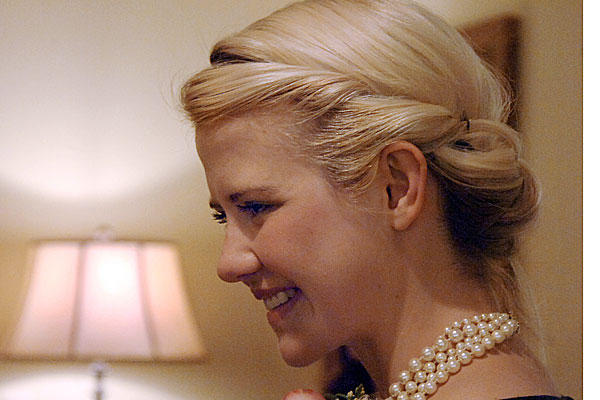 I’m sure that the person who gave this lesson meant well, but that object lesson (along with its cousins: the nail in the board, the licked cupcake, and the crumpled rose) is an example of purity culture, and purity culture is Satanic. Most of the time when we talk about sin, we use a mistake-paradigm. Sins are mistakes, and through the Atonement they can be fixed. Jesus says “though your sins be as scarlet, they shall be as white as snow; though they be red like crimson, they shall be as wool.”[ref]Isaiah 1:18[/ref] It is true that the Atonement cannot erase the consequences of our sins, but it can and does make us whole. That’s the point, and for the most part, it’s what we teach.
I’m sure that the person who gave this lesson meant well, but that object lesson (along with its cousins: the nail in the board, the licked cupcake, and the crumpled rose) is an example of purity culture, and purity culture is Satanic. Most of the time when we talk about sin, we use a mistake-paradigm. Sins are mistakes, and through the Atonement they can be fixed. Jesus says “though your sins be as scarlet, they shall be as white as snow; though they be red like crimson, they shall be as wool.”[ref]Isaiah 1:18[/ref] It is true that the Atonement cannot erase the consequences of our sins, but it can and does make us whole. That’s the point, and for the most part, it’s what we teach.
Except when it comes to sexual sins. Then, suddenly, we switch from a mistakes-paradigm to a purity-paradigm. You can fix something that is broken, but rotten meat is bad forever. Even more pernicious, however, purity-culture makes it seem as though virginity and chastity are the same thing. This implies that even a victim of a rape should somehow bear the guilt of sexual transgression. That is an abominable and indefensible teaching. The mistakes-paradigm is compatible with Christianity. Purity culture, although it’s often preached by Christians, is not. It is antithetical to the Savior’s message of hope and redemption. It is what Satan, the accuser, wants us to believe.
As she recounts in her autobiography, Smart remembered that lesson when it could have done the most harm to her. She was rescued from despair, however, by the memory of love. She knew that her mother and father would accept her back with loving and open arms no matter what had been done to her. Throughout her awful ordeal, she remembered the love of her family and felt the love of her Heavenly Father. Love won out, and because of that Elizabeth found the resolve to endure and, in the end, to defeat her tormentors. But first she had to defeat a false teaching she had been subjected to in Sunday school.
There is more to the story. As I wrote at the time, headlines covering her comments ran along the lines of “Elizabeth Smart: Abstinence-only education can make rape survivors feel ‘dirty,’ ‘filthy’” and “Traditional Mormon Sexual Purity Lesson Contributed to Captivity, Elizabeth Smart Tells University Audience.” There was no shortage of those who were ready to use her words to score points for the world’s view of sexual freedom, whether she agreed or not.
The Church’s unwavering adherence to strict moral standards is unusual in our modern society, and it is under constant attack. This attack could have tragic consequences, precisely because the Church’s stark and plain teachings on chastity and morality have measurable, beneficial effects. A 4-year study conducted at the University of North Carolina found that, compared to other religious denominations, Mormon youths were more devout, more able to articulate their own faith, and more likely to adhere to the standards set by the Church. As Deseret News reported, the study found that fewer Mormon teens:
- Engaged in sexual intercourse
- Had ever smoked pot
- Drank alcohol a few times a year
- Watched x-rated or pornographic programs in the past year
There’s good reason to believe that clear teachings contribute to these measurably different outcomes for Mormons. Researcher Stephen Vaisey interviewed more than 20 Mormon youths for the project, and subsequently noted:
One of the groups that stood out … were the Mormons. In general they tended to be more articulate about their religion, what their religion actually taught and what kind of religious constraints it placed on them. [emphasis added]
Plain and unflinching talk from Church leaders is a shield between our children and the dangerous temptations of our modern world. These teachings are not a matter of sheltering youth, but rather of empowering them to see clearly the choices that lie before them.
We are trapped between the rock of purity culture and the hard place of the world’s dismissal of the seriousness of sexual sin.
Daggers Placed to Pierce Their Souls
The response to my original post that surprised me the most was the oft-repeated complaint that I had skipped over the worst line in the talk. That was:
In the end, most women get the type of man they dress for.
Some folks accused me of leaving it out because I didn’t know how to account for it, but the truth is that I left it out because it didn’t even register as problematic. I took it to be just a simple observation that dress, along with many other factors, is one way that like-minded individuals identify potential mates in a process known in economics, sociology and anthropology as assortative mating. If you would like to marry a man who values modesty in dress, then it makes sense to dress modestly. (The existence of assortative mating is itself so well known that some studies fault it for rising income inequality.)
Others, however, pointed out that the word “get” as opposed to “marry” was just too similar to the phrase “get what they deserve” and that, combined with a reference to a woman’s dress, it was just too close to victim-blaming. I do not dispute the validity of this reaction. One of the things I’ve learned, especially in private discussions, is that people can react to the same words in very, very different ways and that if you are willing to listen you will generally learn that people have good reasons for reacting the way that they do.
More than anything else, these discussions reminded me of Jacob’s haunting and cutting words when he spoke about chastity:
7 And also it grieveth me that I must use so much boldness of speech concerning you, before your wives and your children, many of whose feelings are exceedingly tender and chaste and delicate before God, which thing is pleasing unto God;
8 And it supposeth me that they have come up hither to hear the pleasing word of God, yea, the word which healeth the wounded soul.
9 Wherefore, it burdeneth my soul that I should be constrained, because of the strict commandment which I have received from God, to admonish you according to your crimes, to enlarge the wounds of those who are already wounded, instead of consoling and healing their wounds; and those who have not been wounded, instead of feasting upon the pleasing word of God have daggers placed to pierce their souls and wound their delicate minds.
10 But, notwithstanding the greatness of the task, I must do according to the strict commands of God, and tell you concerning your wickedness and abominations, in the presence of the pure in heart, and the broken heart, and under the glance of the piercing eye of the Almighty God.[ref]Jacob 2:7-10[/ref]
I always imagined, when I read these verses as a kid, that the women and children in the crowd must have just had very delicate Victorian sensibilities about the topic of sex. Now I realize how dubious that reading is, and I wonder how many of those in the audience had been traumatized by sexual assault, rape, and abuse. I don’t say this to give Elder Callister a get-out-of-jail-free card, because after all the big difference between Jacob’s words and the Ensign article is that Jacob gave this extended apology/warning (the earliest known trigger warning?) and Elder Callister did not.
My position is this: I think Elder Callister meant no ill will, and that it’s probably impossible to talk about these issues without causing pain to at least some people. As an audience, we should try to understand the principle behind the words. But I also would hope that our leaders can continue to learn how to be as careful as they may, without diluting the message, in picking their words, and I sincerely acknowledge the validity of those who were hurt by these words. Perhaps it is some comfort, in re-reading Jacob 2, to find yourself in good company.
What is Rape Culture, Anyway?
A post at Feminist Mormon Housewives called me out for misunderstanding what the term “rape culture” means. To be fair: that’s valid. I have my own definition of rape culture, but I shouldn’t have used a non-standard definition without more carefully explaining what it was and that it’s non-standard. I’m not going to get into that now, either (although the basics are in my original post). Instead, let’s just pause and consider a small irony.
One of the primary concerns with Elder Callister’s talk is that he used words and phrases that could be hurtful to his audience, even if the hurtful meaning wasn’t intended or even logically implied by his words. And that is valid. But wouldn’t the same concern apply to deploying a deliberately inflammatory term like “rape culture” to describe the talk? After all, there are quite a few people who aren’t familiar with the technical definition (that’s not in dispute, since the FMH post takes the trouble of providing the definition) so, by their own logic, perhaps critics ought to be more careful with their language? Just to be clear, my concern is not that Elder Callister’s feelings might be hurt, but rather that a very large number of faithful Mormons who do not keep current on feminist political terminology will be confused and hurt when some of their fellow Mormons start associating a general authority and advocacy of rape. So really, by the logic of the critics of the talk, we shouldn’t even be having a conversation using the term “rape culture” at all.
The substance of the rape culture accusation could be made without the incendiary terminology. Using the conventional definition, rape culture is the idea that common attitudes can lead indirectly to rape. Specific examples of rape culture include anything that condones or advocates (1) victim-blaming, (2) sexual objectification, or (3) trivializing rape. I don’t think anyone is seriously arguing that the talk trivializes rape. We’ve already talked about how the “get the type of man they dress for” line sounded like victim blaming. I have already conceded the validity of that painful association, but I am not willing to go from sounds like victim-blaming to engages in victim-blaming. (The observation that women’s dress can affect men doesn’t rise to the level of victim-blaming, either.)
So that leaves sexual objectifcation. Here the problem is not with any particular phrasing of any particular talk, but with the concept of modesty as it exists in Mormonism. Critics argue that emphasizing modest dress turns women into sexual objects, and that the only solution is to talk about modesty less. (They also argue that we should encourage women to dress modestly for themselves and not just for the sake of men, but I’m not going to go into that because I agree with it.) So, should the Church shut up about modesty, or at least talk about it a little bit less?
Will the Real Moderates Please Stand Up
As I mentioned, the number one criticism of my post was that I had skipped over the “get the type of man they dress for” line. Only slightly less prominent, however, was the argument that the critics of Elder Callister’s talk didn’t have anything against the Church’s standards or teachings on modesty. The theory was that the big kerfuffle wasn’t about what Elder Callister said. It was just about how he said it. I don’t for a moment doubt that the folks who told me that were sincere, but it’s worth pointing a couple of things out. First, even though some of them said (effectively) “I’m not going to criticize the content, just the delivery” they also disagreed with the content. Their position was “I think Elder Callister is wrong about sexual morality, but I’m choosing only to criticize his delivery. Not his message.” In other words, lots of the critics do, indeed have a beef with the Church’s positions. Secondly, plenty of the folks criticizing the talk did quite plainly criticize the Church’s teachings as well.
The original piece that set me off (Natasha Helfer Parker’s Morality? We can do much better than this) included an explicit rejection of the Church’s teaching that homosexuals ought to remain chaste and urged a shift to accepting monogamous gay sexual relations as moral. Several of the commenters on my piece insisted that, since there’s no direct scriptural evidence against masturbation, it ought not to be considered a sin (or at least, not a serious one). I was tempted to write this off as one of those weird, fringe issues that make the Internet such an interesting place until another piece at Feminist Mormon Housewives made the exact same case:
If you are going to say that the Lord condemns masturbation, please cite me chapter and verse on that. Masturbation is something that a vast, VAST majority of people on the earth and in the church have done. If it is sinful, it is a sin like lying, being inconsiderate, or any number of other mistakes that we all deal with.
And of course, in addition to teachings on homosexuality and masturbation, there are also those who would call for the Church to stop speaking so loudly and clearly about modesty. So, to my friends who tried to tell me that I was getting upset at nothing because no one actually challenged the Church’s teachings, I have to say: “look again.”
Keep in mind that in the first section of this post I argued (1) that the Church’s uniquely clear teachings on moral issues had led to uniquely positive results for our youth and (2) that the world outside is ready to abuse any possible opening to attack those teachings. In that context, the important thing isn’t that certain members of the Church feel comfortable publicly calling for the Church to retreat from traditional teachings. Instead, the important thing is why. What is the rationale behind this call for the Church to moderate moral teachings?
Sara Katherine Staheli Hanks’ (who wrote the FMH piece quoted above) argument boils down to the ever-classic: But everyone’s doing it! (Her exact words, just to re-quote, were that “Masturbation is something that a vast, VAST majority of people on the earth and in the church have done.” So, how bad can it be, right?) Parker, on the other hand, wrote that the standard on homosexual sex should be lowered because it “sets the Mormon LGBTQ population up for almost guaranteed failure,” and then broadened that logic at the end when she said: “The way that sexual standards are presented in this type of talk is unrealistic and sets people up for failure.”
It’s impossible to tell exactly which standards, other than those concerning homosexuality, Parker believes the Church should revise downwards, but the logic is basically limitless. If we accept the idea that whenever the Church’s standards get too high we need to lower them to more realistic levels, then they aren’t really standards at all. They are more like best practices or conventions. The principle of idealism cannot survive that assault. As I stated in my original piece: this logic is fundamentally anti-Christian. It’s the counterpart to purity culture. Purity culture says the Atonement cannot save you, and lowering standards until people can achieve them on their own says the Atonement is not needed to save you. These are just two different ways to repudiate the Gospel.
As much as moderate critics of Elder Callister’s talk may earnestly and sincerely believe in simply improving the way that we talk about sexual morality, it’s important to realize that we’re having that conversation in the midst of a greater battle. There are people both inside and outside the Church who are more than happy to use sincere complaints about how the Church teaches what it teaches to fuel their complaints about what the Church teaches. I don’t think that means that moderate critics ought to be silent or that their concerns are not legitimate. I just hope it explains the reaction of folks like me.
The Man-in-the-Middle Attack
This last section of my response is the most theoretical, but perhaps also the most important. It starts with a concept from cryptography. The man-in-the-middle attack is basically just what it sounds like: two people are trying to communicate to each other and a third party steps between them, intercepts the message, modifies it (possibly), and then sends it on. For example, if you’re logging on to your bank and a hacker is trying to intercept your communication to steal your password, then he’s trying to pull off the man-in-the-middle attack.

Let’s imagine someone trying to pull of a man-in-the-middle attack to sabotage communication between the general authorities (at one end) and the members of the Church (on the other end). A silly example would be to try and hack into the Church’s servers and modify the text of the Ensign so that what the GAs sent out and what the members received wasn’t the same. That’s a silly example because it would be so obvious (among other reasons). But what if, instead of hacking into the Church’s servers, an adversary were to metaphorically hack into the minds of members of the Church and change the way they perceived certain words and phrases? In that case, the words the General Authorities used would not mean the same thing to their audience that they meant to the General Authorities. More importantly, however, the sabotage would be a lot harder to detect because everyone would be so busy arguing about what the “right” meaning of the terms was. The argument over who to blame, the leaders or the members, would obscure the deeper reality: someone had driven a wedge between the watchmen on the walls and the people they are there to warn.
What might this look like in practice? The most obvious examples is the way that professional counselors (like Parker) took Elder Callister to task for using the word “abuse” (when he called masturbation “self-abuse”) in a non-technical sense. Not only did Parker do this, but Hanks followed suit: “Do not co-opt a clinical term used to describe things like ritualistic cutting or burning of the skin to describe masturbation.” This is a fundamental misunderstanding of the way language works. Every specialized discipline in the world finds the need to invent new jargon and repurpose existing words from everyday language, but these technical terms are derived from the ordinary words and they are only valid within specific contexts. To argue that someone in a non-specialist outlet ought to be subject to specialized use of a term is not only irrational, it’s impossible. This is because quite often the same word will get repurposed again and again by different specialties. Off the top of my head, the phrase “tipping point” has a perfectly understandable meaning in plain English, but it also has a more technical meaning in economics and another, different, technical meaning in catastrophe theory. There’s a reason that Wikipedia had to invent disambiguation pages.
This example is too obvious to be a really powerful man-in-the-middle attack. The whole point of Parker’s critique is to assert the dominance of her expertise by calling Elder Callister wrong. Later on, when it starts to become a matter of course that we should bow to expert terminology, it may start to function as a man-in-the-middle attack, but for now we’re looking for a more subtle example. For example: Is it possible that the reaction to the “get the type of man they dress for” line is exacerbated because adherents of rape culture are actively looking for suspicious phrases? In other words, if you really believe in a political philosophy dedicated to unmasking sinister meanings behind otherwise ordinary terms, you’re probably going to find them whether they exist or not. This is the same danger behind accusation of dog whistle politics. When you’re accusing someone of something that is by definition hidden, how can they defend themselves? The reality is that anyone dedicated enough and clever enough is going to be able to find evidence of rape culture just about anywhere with only a little bit of effort and creativity.
This may seem like an academic quibble about linguistics, but the reality is that arguments about language are almost always really arguments about principles in the end. Without questioning the validity or sincerity of those who were hurt by Elder Callister’s word choice, I simply want to raise the possibility that in figuring out who is to blame, we may want to consider those who actively encourage us to look for evil intentions behind every ordinary turn of phrase. To the extent that secular politics (from any end of the spectrum) start to change the way we perceive the words we hear, there’s a risk that we’re starting to lose contact with the General Authorities. We should probably make it a matter of conscious effort to set aside our political filters somewhat when listening to what they have to say.
On Rape Culture in the Ensign (The Lack Thereof)
(Note: I published a follow-up to this post on March 6, 2014.)
The March 2014 edition of the Ensign (which is the official monthly magazine of the Church of Jesus Christ of Latter-day Saints) is already available online. The cover article, called “What is the Lord’s Standard for Morality” is stirring up headlines like Controversial LDS Article Raises Concern Of ‘Rape Culture’ and attracting vociferous rebuttals like Morality? We can do much better than this.
The article is by and large a tame restatement of the basic moral principles of the Church of Jesus Christ of Latter-day Saints as they relate to sex. These standards are pretty much identical to the basic moral principles of all traditional faiths. Quoting from the article:
The Lord’s standard of morality is not so much a list of do’s and don’ts as it is a principle, which can be expressed as follows: The procreative power is to be exercised in the marriage relationship for two key reasons: (1) to bind and strengthen ties between spouses and (2) to bring souls into the world. These uses have the blessing and endorsement of the Lord.
Despite the fact that the principle is more than “a list of do’s and don’t’s,” the article goes on to clearly stake out the practical implications of this principle in plain English: Don’t have sex outside of marriage, including homosexual sex at any time. Don’t try to get around the “no sex before marriage” on a technicality, i.e. don’t even fool around. Don’t masturbate. Don’t look at porn. Dress modestly. The ongoing controversy illustrates the necessity of these clarifications.
It’s no surprise that these standards would be ridiculed and dismissed by pop culture. If the world at large doesn’t hate you, then you’re doing something wrong.[ref]If the world hate you, ye know that it hated me before it hated you. If ye were of the world, the world would love his own: but because ye are not of the world, but I have chosen you out of the world, therefore the world hateth you. John 15:18-19[/ref] There’s nothing new or noteworthy about the idea that religious fuddy-duddies and goody-goodies are silly in the eyes of the world. What’s surprising to me, however, is the amount of push-back coming from within the Church. The most problematic paragraph comes from the section about modesty, and reads as follows:
The dress of a woman has a powerful impact upon the minds and passions of men. If it is too low or too high or too tight, it may prompt improper thoughts, even in the mind of a young man who is striving to be pure.
The outrage comes from thinking that goes something like this: if you say that the way women dress controls how men think and feel, you are making women responsible for men’s actions. In fact, this is the very logic used to defend rape culture: women who dress immodestly are “asking for it”. Therefore, the Ensign is now perpetuating rape culture.
Let’s deconstruct this reasoning.
First, to say that “the dress of a woman has a powerful impact upon the minds and passions of men” is not the same as saying “women control men’s thoughts.” In every other human interaction, we’re perfectly capable of understanding that a person can influence you without controlling you.[ref]This is what the word “interaction” means: each person influences and is influenced by each other person they meet.[/ref] If someone cuts you off in traffic, they are going to have a “powerful impact” on your mood. That’s a fact. But your reaction to that provocation is still your decision and therefore your responsibility. That’s another fact. These two facts, (1) that someone can influence you and (2) that ultimately your behavior is still your own responsibility are two facts that people seem to have no problem accepting simultaneously until the discussion turns to modesty. Then suddenly we get this bizarre notion that we can’t say “women have an influence on men” without saying “everything men do as a result is a woman’s fault.” That bizarre notion makes no sense, and doesn’t appear (explicitly or implicitly) in the article.
This article doesn’t claim that women are responsible for men’s thoughts. That’s the accusation, and it is false. Men are still responsible for their own thoughts, but it would be nice if women would dress modestly to help them out. Just as people are responsible for keeping their tempers in control, but it’s generally considered common courtesy not to provoke people unnecessarily. Let me reiterate: if I say “Be nice, because it will help other people not lose their temper,” it doesn’t mean that I’m saying it’s your responsibility whether or not some random stranger loses his or her temper. Even though we interact with each other, we are ultimately responsible for our own behavior, and that’s it. The Ensign shouldn’t need to specifically call this out, because it’s right there in the 2nd Article of Faith: “We believe that men will be punished for their own sins.”[ref]Articles of Faith[/ref]

Allow me to observe, at this point, that not only does the article not blame women for men’s mental purity, but it never even gets remotely close to discussing rape. That’s… not even in the ballpark. Let’s be really, really, really clear. An Ensign article making the entirely obvious observation that men respond to the way women dress is not “rape culture”. A young girl being brutally raped by football players and then being harassed when she appeals for justice until her family is driven out of town and their house is burned down, that is rape culture. CNN reporters who talk about what a tragedy it is for rapists to be found guilty of rape and deprived of their promising futures, that is rape culture. Everyone talking about the fictitious death of Manti Te’o’s non-existent girlfriend while totally ignoring the actual suicide of “Lizzy Seeberg… not long after being intimidated by Notre Dame football players for reporting a sexual assault by one of their teammates,” that is rape culture. Chris Brown being accepted back into polite society (with a few notable exceptions), that is rape culture. Roman Polanski being embraced by his peers after his crimes? That is rape culture. Woody Allen being defended after the very credible allegations of his crimes? That is rape culture. Ray Rice having a fine and dandy career after video emerges of him dragging his unconscious fiancee out of an elevator (because he knocked her unconscious) that will be rape culture if that’s how the story ends. Even if you think the Ensign article is wrong and misguided, putting it in the same category as these (horrifically numerous) examples of rape culture is like comparing every bad thing that happens to the Holocaust. It trivializes real evil and makes you look like a fool.[ref]The fact that I could enumerate all of those examples of real rape culture off the top of my head shows how serious the problem is.[/ref]
I understand that there are more moderate criticisms as well, such as the fact that modesty standards often seem to be unequally applied to women vs. men. They appear to be unequally applied because they are unequally applied. They are unequally applied because of the fundamental reality that females are on the supply side and men on the demand side of the sex equation. That is common sense which everyone who is not motivated by politics can see, but it is also (in case you’re skeptical) scientific fact. Men and women approach sex differently[ref]There is also tons of individual variation.[/ref] but it is men who are primarily motivated by visual cues and also who want to have sex more frequently and more casually. (Once again, these aren’t just random assertions. There is data.) A gender-blind approach to sexuality would be no more reasonable than a gender-blind approach to professional sports. If the WNBA did not exist, how many women would make the cut to play pro basketball against men? Zero. Pretending gender differences do not exist when they do in fact exist may be politically expedient, but it does not actually serve the interests of equality.[ref]Also: lower the rim already.[/ref] If you’re looking for symmetry, this is where you will find it: women are encouraged to dress modestly (partially for their sake, partially for the sake of men) and men are encouraged[ref]actually: commanded[/ref] to stop watching porn (partially for their sake, partially for the sake of women). There is equality, but not sameness, in the Lord’s standards for sexual morality. Make no mistake: that is the core outrage which this article perpetuates in the minds of its critics. Mormonism espouses a view of humanity in which gender matters, and therefore believes that men and women owe certain obligations to each other in a complementary relationship. The modern world espouses a denialist political ideology in which gender has no deep or lasting significance that we do not create for ourselves.
It is also no great surprise to me that so much of the outrage at the article is coming from professional therapists. The article invites that response when it leads off with a bold statement that God, and therefore the Church, is the ultimate arbiter of sexual morality.
Some years ago my father, an attorney, was trying a lawsuit. For his authority, he cited only one case—a California Supreme Court case issued many years before. His opponent cited a number of lowercourt decisions of more recent vintage. The judge said to my father, “Mr. Callister, don’t you have a more recent case than this?” My father looked at the judge and replied, “Your Honor, may I remind you that when the supreme court speaks on a matter, it only needs to speak once.” The judge nodded with approval. He was reminded that the supreme court trumps all lowercourt decisions, how ever numerous or recent they may be.
So it is with God our Father—He needs to speak only once on the issue of morality, and that one declaration trumps all the opinions of the lower courts, whether uttered by psychologists, counselors, politicians, friends, parents, or would be moralists of the day. [emphasis added]
In fact, the reaffirmation that the Church has the final word on these matters may be the only truly novel claim made in the article. Everything else is a restatement of traditional beliefs. This one is hardly surprising, but it is fairly novel. So it’s natural that psychologists and counselors would lash out in response. It’s a turf war: who gets to define moral standards for sexuality? The Church? Or the APA?[ref]It reminds me of the especially harsh reviews of Shyamalan’s Lady in the Water which almost never mentioned the fact that Shyamalan put a very unlikeable movie critic in the movie as a character and then killed him.[/ref]
Let’s take a look at the claims made by one counselor in particular, as a representative of the apparent conflict between General Authorities and counselors. Natasha Helfer Parker, in her article Morality? We can do much better than this… has a bullet-list of issues with the Ensign article. She starts by claiming that the article leaves no room for personal revelation. This is obviously not true, as personal revelation is always necessary in addition to official pronouncements and even scripture. That is a fundamental and constant principle of Mormonism. It does not need to be restated in every article. However, in this particular case, I’m wondering precisely what revelation she has in mind. Is she suggesting that if you pray and ask, God might just tell you to go ahead and have sex outside of marriage? There are often shades of gray and complications with applying moral principles, but the “no sex outside of marriage” one is about as universal and clear as it gets.[ref]And you thought Joseph Smith had to be persistent to get permission to give Martin Harris the 116 pages…[/ref]
She next takes the article to task for calling masturbation “self-abuse” because “this is not an appropriate clinical term.” She may not have noticed, however, the Ensign is not a clinical journal. The inability of experts to understand that specialized terminology must give way to common vernacular in non-specialized contexts is faintly amusing. It reminds me of the time that an outraged medical doctor told my father (a professor of English) that it was unfair for PhDs to be referred to as “doctor” because medical doctors had to study harder and did so much more good. My dad smiled, and reminded him that hundreds of years ago when college professors were already using the term “doctor,” the medical professionals of that day were known as “leeches”. Perhaps if he wanted a unique title, he could try and resuscitate that one?[ref]Pro-tip, don’t badger an English professor about the meaning of words.[/ref]
Most of the rest of the bullet points rely on the same tired strawman approach of insisting on seeing a viewpoint you don’t like in its most crude and absolutist form. But the most sinister criticism she levels is the one that comes at the end of the bullet list, although it’s a sentiment that pervades the entire piece, and that is this: “The way that sexual standards are presented in this type of talk is unrealistic and sets people up for failure.”

Well now, we wouldn’t want to set people up for failure, now would we? Contrast this sentiment with Paul’s simple statement that: ” all have sinned, and come short of the glory of God.”[ref]Romans 3:23[/ref]
If not all have sinned, than the Atonement is not necessary. If the Atonement is not necessary, then Christ is superfluous. If Christ is superfluous, then the Gospel is a joke. What good news? We have no need of a savior. We just lower moral standards to the lowest common denominator (or maybe pray for an exemption) and then everyone gets to heaven on their own merits. This well-intentioned call for lowered-standards is sadly anti-Christian. The entire message of Christianity–not just Mormonism, but all Christianity–is that none of us can live up to God’s impossible standards. She faults this Ensign article, but it was Jesus himself who said “Be ye therefore perfect, even as your Father which is in heaven is perfect.”[ref]Matthew 5:48[/ref] Maybe we ought to just hand Parker a copy of the New Testament and a red pen and let her tell us what Jesus should have said.
I will say at least this much for Parker: the fact that she couldn’t even get to the end of one article without cutting out the beating heart of Christian faith provides a very clear example of just how important it is that the business of articulating eternal standards stay in the hands of the General Authorities.

